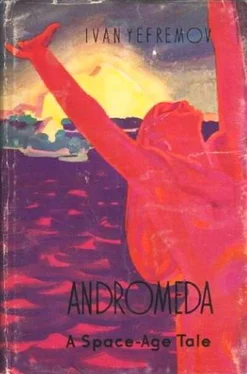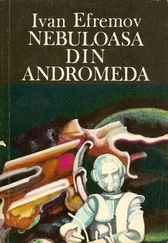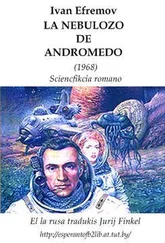Ivan Yefremov - Andromeda (A Space-Age Tale)
Здесь есть возможность читать онлайн «Ivan Yefremov - Andromeda (A Space-Age Tale)» весь текст электронной книги совершенно бесплатно (целиком полную версию без сокращений). В некоторых случаях можно слушать аудио, скачать через торрент в формате fb2 и присутствует краткое содержание. Город: Moscow, Год выпуска: 1959, Издательство: FOREIGN LANGUAGES PUBLISHING HOUSE, Жанр: Фантастика и фэнтези, на английском языке. Описание произведения, (предисловие) а так же отзывы посетителей доступны на портале библиотеки ЛибКат.
- Название:Andromeda (A Space-Age Tale)
- Автор:
- Издательство:FOREIGN LANGUAGES PUBLISHING HOUSE
- Жанр:
- Год:1959
- Город:Moscow
- ISBN:нет данных
- Рейтинг книги:5 / 5. Голосов: 1
-
Избранное:Добавить в избранное
- Отзывы:
-
Ваша оценка:
- 100
- 1
- 2
- 3
- 4
- 5
Andromeda (A Space-Age Tale): краткое содержание, описание и аннотация
Предлагаем к чтению аннотацию, описание, краткое содержание или предисловие (зависит от того, что написал сам автор книги «Andromeda (A Space-Age Tale)»). Если вы не нашли необходимую информацию о книге — напишите в комментариях, мы постараемся отыскать её.
Andromeda (A Space-Age Tale) — читать онлайн бесплатно полную книгу (весь текст) целиком
Ниже представлен текст книги, разбитый по страницам. Система сохранения места последней прочитанной страницы, позволяет с удобством читать онлайн бесплатно книгу «Andromeda (A Space-Age Tale)», без необходимости каждый раз заново искать на чём Вы остановились. Поставьте закладку, и сможете в любой момент перейти на страницу, на которой закончили чтение.
Интервал:
Закладка:
“May I come with you?” asked the biologist, jumping towards the commander.
“Come along, only remember, I won’t take anybody else! You need that….”
The two men crawled for a long time, hanging on to irregularities and cracks in the stones and keeping as far as possible out of the way of the whirlwinds. The hurricane did its best to tear them from the ground, turn them over and roll them along. Once it succeeded but Erg Noor managed to catch hold of Eon Thal as he rolled past, dropped flat on his stomach and caught hold of a big boulder with his hooked gloves.
Nisa opened the hatch of her turret and the two men crawled into the narrow space. It was quiet and warm inside, the turret stood firm, securely anchored against the storms their wisdom had foreseen. The auburn-headed astronavigator frowned but was glad to have companions. She frankly admitted that she was not looking forward to spending twenty-four hours alone in a storm on a strange planet.
Erg Noor informed Tantra of their safe arrival and the searchlight was turned off. The tiny lamp in the turret was now the only light in that kingdom of darkness. The ground trembled under the gusts of wind, the lightning and the passing whirlwinds. Nisa sat in a revolving chair with her back against the rheostat. The commander and the biologist sat at her feet on the round ledge formed by the base of the turret. In their spacesuits they occupied almost all the space inside the turret.
“I suggest we sleep,” came Erg Noor’s soft voice in the telephones. “It’s a good twelve hours to the black sunrise when the storm will die down and it will be warmer.”
His companions readily agreed. And so the three of them slept, held down by triple weight, enclosed in their spacesuits, hampered by the stiff “skeleton” in the narrow confines of a turret that was shaken by the storm. Great is the adaptability of the human organism and great its powers of resistance!
From time to time Nisa woke up, transmitted a reassuring message to the watcher on Tantra and dozed off again. The hurricane was blowing itself out and the earth tremors had ceased. The “nothing,” or, more correctly, the “something” might appear now. The observers on the turrets took VP, vigilance pills, to liven up a tired nervous system.
“That other spaceship bothers me,” confessed Nisa, “I should so much like to know who they are, where they came from and how they got here.”
“So would I,” answered Erg Noor, “only it’s obvious how they got here. Stories of the iron stars and their planet traps have long been circulating round the Great Circle. In the more densely inhabited parts of the Galaxy, where ships have been making frequent trips for a long time already, there are planet graveyards of lost spaceships. Many ships, especially the earlier types, got stuck to those planets and many hair-raising stories are told about them, stories that are almost legend today, the legends of the arduous conquest of the Cosmos. Perhaps there are older spaceships on this planet that belong to more ancient days, although the meeting of three ships in our sparsely populated part of the Galaxy is an extraordinary event. So far not a single iron star was known to exist in the vicinity of the Sun, we have discovered the first.”
“Do you intend to investigate the disc ship?” asked the biologist.
“Most certainly! Could a scientist ever forgive himself if he let such an opportunity go? We don’t know of any disc spaceships in regions neighbouring on our solar system. This must be a ship from a great distance that has, perhaps, been wandering about the Galaxy for several thousand years after the death of the crew or after some irreparable damage. Many transmissions round the Great Circle may become comprehensible to us when we get whatever material there is in the disc ship. It has a very queer form, it’s a disc-shaped spiral, the ribs on its exterior are very convex. As soon as we have transferred the cargo from Parus we’ll start on that ship but at present we cannot take a single person away from work.”
“It took us only a few hours to investigate Parus.” “I have examined the disc ship through a stereotelescope. It is sealed tight, not a single opening is to be seen anywhere. It is very difficult to penetrate into any Cosmic ship that is reliably protected against forces that are many times stronger than our terrestrial elements. Just try and get into Tantra, through her armour of metal with a reorganized internal crystal structure, through the borason plating — it would be a task equal to the siege of a fortress. It’s still more difficult to deal with an alien ship, the principles of whose structure are unknown to us. But we’ll make an attempt to find out what it is!”
“When are we going to examine what we’ve found in Parus?” asked Nisa. “There should be some staggeringly interesting observations made in those marvellous worlds mentioned in the message.”
The telephone transmitted the commander’s good-natured laugh.
“I’ve been dreaming of Vega since childhood and am more impatient than any of you. But we’ll have plenty of time for that on the way home. The first thing we have to do is get out of this darkness, out of this inferno, as they used to say in the old days. The Parus explorers did not make any landings otherwise we should have found the things they brought from those worlds in the collection rooms of the ship. You remember that despite the thorough search we made we found only films, measurements, lists of surveys, air tests and containers of explosive dust.”
Erg Noor stopped talking and listened. Even the sensitive microphones did not register the slightest breath of wind — the storm was over. A scraping, rustling sound came through the ground from outside and was echoed by the walls of the turret.
The commander raised his hand and Nisa, who understood him without words, extinguished the light. The darkness seemed as dense inside the turret, warmed up with infrared rays, as if it were standing in black liquid on the bed of an ocean. Flashes of brown light showed through the transparent hood of silicoborum. The watchers clearly saw the lights burn up and for a second form tiny stars with dark-red or dark-green rays; they would go out and then appear again. These little stars stretched out in lines that wavered and bent into circles and figures of eight, and slid soundlessly over the smooth diamond-hard surface of the hood. The people in the turret felt a strange, acute pain in their eyes and a sharp pain along the bigger nerves of the body as though the short rays of the brown stars were stabbing the nerve stems like needles.
“Nisa,” whispered Erg Noor, “turn the regulator on to ‘full’ and switch on the light suddenly.”
The turret was lit up with a bright, bluish terrestrial light. The people were blinded by it and could see nothing, or practically nothing. Eon and Nisa managed to see — or did they imagine it? — that the darkness on the right-hand side of the turret did not disappear immediately but remained for a moment as a flattened condensation of gloom with tentacles attached. The “something” instantaneously withdrew its tentacles and sprang back into the wall of darkness that the light had pushed farther from the turret.
“Perhaps those are phantoms?” suggested Nisa, “phantom condensations of darkness around a charge of some sort of energy, like our fire balls, and not a form of life at all. If everything here is black why shouldn’t the lightning be black, too?”
“That’s all very poetical, Nisa,” objected Erg Noor, “but hardly likely. In the first place the ‘something’ was obviously attacking, was after our living flesh. It or its brethren annihilated the people from Parus. If it’s organized and stable, if it can move in the desired direction, if it can accumulate and discharge some form of energy, then, of course, there can be no question of an atmospheric phantom. It’s something created from living matter and it’s trying to devour us!”
Читать дальшеИнтервал:
Закладка:
Похожие книги на «Andromeda (A Space-Age Tale)»
Представляем Вашему вниманию похожие книги на «Andromeda (A Space-Age Tale)» списком для выбора. Мы отобрали схожую по названию и смыслу литературу в надежде предоставить читателям больше вариантов отыскать новые, интересные, ещё непрочитанные произведения.
Обсуждение, отзывы о книге «Andromeda (A Space-Age Tale)» и просто собственные мнения читателей. Оставьте ваши комментарии, напишите, что Вы думаете о произведении, его смысле или главных героях. Укажите что конкретно понравилось, а что нет, и почему Вы так считаете.











